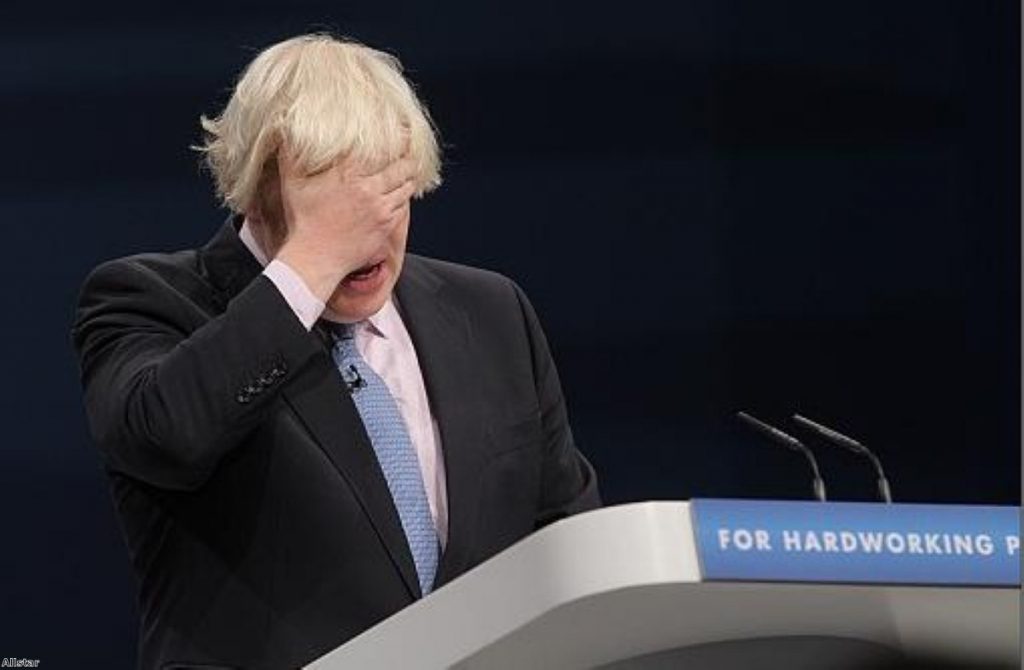Boris Johnson’s ‘plain-speaking’ reputation hides a slippery politician
Where has Boris Johnson gathered his reputation for being 'plain speaking' from? I only ask because I have just sat through his latest "Ask Boris" session on LBC, and to my ears he has some claim to being labelled the most evasive and deceptive politician in the country.
The London mayor was asked questions on everything from the war in Syria, to civil liberties, to 24-hour travel on the Tube and he didn't give a straight answer to a single query.
Asked whether he supported Theresa May's plans for blanket surveillance of UK internet use, he replied that he had "become really fairly tough on this" and wanted the police to know "where people are going on their mobile phones". However he added that he didn't want "relatively junior police officers randomly trawling through people's emails" as a "means of oppression."
This is a classic Boris tactic. In a few short sentences he appeared to be actively against government intrusions on individual's privacy while at the same time entirely supporting them. By constructing the false idea of junior police officers trawling at random through people's email accounts, he was able to oppose something which isn't even being proposed, while at the same time supporting something entirely different which actually is. Like his famous comments about not wanting "social cleansing" in London, he appeared to be at opposition to government policy while in reality being totally in support of it. As such, he managed to please both supporters and opponents of the government, without actually putting himself firmly on the side of either.


Boris once described trying to take on Tony Blair as trying to "nail jelly to the wall". Well watching an interview with Boris is like seeing someone try to staple blancmange to a stick.
Boris was next asked about events in Syria and what to do about President Assad. He said that the West "should get rid of Assad. He's a tyrant." However, when asked who or what should replace him, he replied that "I don't have an answer to that," adding that "the record in the West of getting rid of Baathist strongmen is not a good one." He then suggested he was in favour of the UK government's position on the issue while literally seconds later saying that position was "confused". To cap it all off he went on to say that "perhaps it would have been better if [Assad] had retained his grip on power."
Want to know what a prime minister Johnson would do in Syria or the wider Middle East? After listening to him this morning, your guess is as good as mine.
Host Nick Ferrari asked him whether he would lead the campaign to leave the EU. Boris replied that his leadership of "any campaign" would be "fatal" but added that he would see what the outcome of David Cameron's negotiations were. He then said that in an "ideal world" he wanted to stay in the EU but added that "the penalties of getting out of the EU are lower" than they have ever been. So does Boris want to leave the EU or stay in, be on the campaign for Brexit or on the campaign against Brexit? After listening to his answers today I'm not convinced even he knows the answer.
Another caller wanted to know about the 24 hour night Tube, originally promised by Boris to begin at the start of this autumn. Asked whether it would now open at all before he leaves office next May, Boris repeatedly refused to answer. Pressed on the launch date he replied: "This is something we should have but it is not something which I regard as you know absolutely critical," adding that "I've go to tell you this is something the City of London has done without for 150 years." So is the Night Tube happening or not happening? Who knows?
Boris was finally asked about Uber. Again Boris deployed his tactic of pleasing both everybody and nobody. He said that the government appeared to be "besotted" with Uber and "Californian tech giants" who "don't pay their tax". He went on to suggest that the government were refusing to clamp down on them. However, asked what his own position on Uber was, he replied that they were very popular and "convenient" and that there were "two sides" to the argument. One final dollop of blancmange stapled to the stick, he drew the session to a close.
Modern politicians are rightly criticised for their use of evasive language. In an era of management speak and media training, Boris is understandably praised for his use of plain English and vivid metaphors.
But just because a politician can speak in an interesting way, does not mean that what they are saying is actually interesting. In fact in many ways, Boris's use of colourful language enables him to be even more slippery and evasive than his far duller Westminster compatriots. By diverting the listener with vivid metaphors and veiled attacks, Boris distracts us from the substance of what he is actually saying. Transfixed by the matador's red cape, the bull charges blindly into the thin air behind him.
Such evasiveness cannot last forever. In many ways Boris's position as mayor has enabled him to be on both sides of pretty much every national political debate over the past eight years. If and when he takes up a national position in government, that slipperiness will be far harder to maintain.

